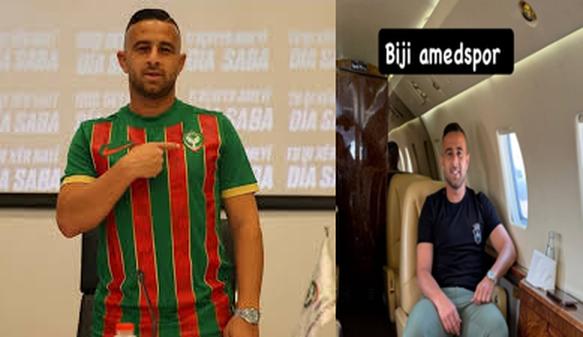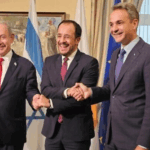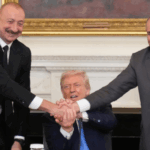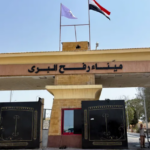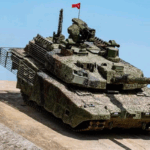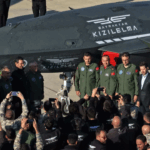As Israeli international Dia Saba arrived in Diyarbakır to sign his contract with Amedspor, many at first saw it as a triumph of sport over politics. Saba, a skilled midfielder with international experience, was framed by some as a professional addition to a club that has long symbolized Kurdish pride and perseverance. But scratch the surface, and the transfer begins to look far less innocent. In reality, Saba’s move is the latest manifestation of Israel’s increasingly cynical use of soft power—a calculated strategy to whitewash its crimes, manipulate public sentiment, and co-opt historically oppressed communities, this time targeting the Kurds.
The first such moment came in 2020 when Saba, a Muslim Arab from northern Israel, became the first Israeli footballer to sign with a club in the United Arab Emirates. That move followed the Abraham Accords, which normalized relations between Israel and several Gulf states. Saba’s presence on the pitch was not merely about goals and assists; it was a carefully orchestrated display of coexistence and normalization. Israeli media widely framed his signing with Dubai’s Al Nasr as a cultural breakthrough—proof that a Muslim Israeli could be embraced in an Arab country long hostile to Israel. Emirati outlets, in turn, used Saba’s success to soften criticism of the Accords, presenting the athlete as a bridge between peoples.
By 2022, Israel had turned its attention to Turkey, where relations had been severed since the 2010 Mavi Marmara incident and remained frigid throughout the 2010s. That year, Israeli President Isaac Herzog paid a historic visit to Ankara, where he met with President Erdoğan and called for a new chapter in Turkish-Israeli relations. Only months later, Dia Saba joined Sivasspor in central Turkey, becoming one of the few Israeli internationals to play in the country. His arrival in a conservative and nationalist Anatolian city sparked muted controversy at first, but ultimately was accepted—thanks in part to Saba’s Muslim identity, which served to defuse tensions. In both Israeli and Turkish press, his move was hailed as a sign that normalization was gaining traction not just at the diplomatic level but in the hearts of ordinary citizens.
That normalization phase is now over. In 2025, Israel no longer seeks reconciliation with Ankara—it sees it as the new enemy. Since the de facto removal of Syria’s Bashar al-Assad in December 2024 and the rise of Turkish-backed Islamist factions in Damascus, Tel Aviv’s foreign policy has undergone a seismic shift. Israeli defense officials and think tanks now describe Turkey, not Iran, as the most immediate and dangerous threat to Israeli interests. They accuse Erdoğan of transforming Syria into a Sunni Islamist proxy, with groups like Hay’at Tahrir al-Sham (HTS) taking power under the guise of reform. In this context, Israel’s new containment doctrine demands new allies—and new images.
And that’s where Dia Saba re-enters the stage—not to rebuild ties with Turkey, but to penetrate the Kurdish consciousness. His transfer to Amedspor, a club known for its cultural defiance and popular support among Kurds across Turkey and beyond, is not an isolated event. It is part of a broader campaign by Israel to fragment Kurdish-Palestinian solidarity, and to rebrand itself as a potential partner to the Kurds, particularly in the wake of deteriorating relations with Ankara.
Saba’s arrival in Diyarbakır—amid Israel’s ongoing war and starvation in Gaza and Erdoğan’s fiery rhetoric condemning Tel Aviv—sparked fierce debate. Social media erupted. Some Kurdish activists called the transfer a betrayal of Palestinian solidarity. Pro-Palestinian Turkish and Kurdish influencers questioned Saba’s past conduct, such as allegedly asking his wife to delete a post mourning Gazan children.
Pro-Amedspor groups, such as Tîma Gel Amedspor, were quick to defend him, emphasizing his faith as if it absolved the contradictions of his role:
“He is a Muslim and under our protection.”
This response mirrors the narrative used during his 2022 move to Sivasspor, suggesting a calculated effort to soften backlash by emphasizing Saba’s Muslim faith—even as he remains a national representative of the Israeli state. In this regard, Saba is not just a Muslim—he is an official ambassador of the Israeli national team, a state actor by association. Therefore, his presence cannot be separated from the regime he represents—one that bombards hospitals and starves children in Gaza, bulldozes homes in the West Bank and now seeks to court Kurds for geopolitical leverage.
What makes this soft power play particularly insidious is that Kurds, like Palestinians, have been systematically used and abandoned by great powers. This is not lost on the Kurdish public. Imprisoned PKK founder Abdullah Öcalan recently warned explicitly about Israel’s manipulative tactics, stating:
“Israel does not genuinely support Kurdish causes. They see us as tools. If they ever gain control over Kurdish territory, they will treat us like Gaza—devastated, isolated, and discarded.”
These words have gained renewed relevance as Israel escalates its cultural and political outreach in the Kurdish sphere. From energy deals in Erbil to intelligence cooperation in northeast Syria, Tel Aviv has long sought to play the Kurdish card. But now, through cultural proxies like Saba, it appears to be testing a new front: soft infiltration of Kurdish identity politics.
The pattern is familiar. During the Syrian civil war, Israel clandestinely supported a dozen or more anti-Assad rebel factions, including those aligned with al-Nusra, the Syrian branch of al-Qaeda. Through Operation Good Neighbor, Israel armed and funded fighters while providing medical support to wounded jihadists—claims later confirmed by top Israeli generals. This policy was not rooted in humanitarianism, but cold calculus: weaken Assad, check Iran, and keep Syria divided. Now, with Assad gone and Turkey in ascendancy, Israel has flipped the narrative—demonizing the very Islamist groups it once enabled and seeking out new alliances, especially among the Kurds, to help contain Ankara’s regional ambitions.
The Kurds, however, are not naive. From Kirkuk to Qamishli, there is a growing understanding that Israel’s interest in Kurdish rights is neither principled nor permanent. In Cyprus, some have drawn direct parallels between the so-called “silent occupation” by Israeli real estate firms and what could soon happen in Diyarbakır or Sulaymaniyah. In Northern and Southern Cyprus, Israeli nationals have quietly bought up coastal land, often through shell companies and dual citizenship loopholes. In Kurdish regions, there is concern that similar tactics may follow—economic penetration followed by political influence under the guise of friendship.
And now, football has become the next frontier. Saba’s Instagram post may look like harmless fandom, but in this context, it is an instrument of psychological influence. It suggests that Israel is not only welcome in Kurdish territory—but that it can be loved. It is a way to soften the image of a state currently being investigated for war crimes, by wrapping it in the smiling face of a footballer aboard a private jet.
But the façade is cracking. Kurdish solidarity with Palestinians runs deep, rooted in shared experiences of statelessness, marginalization, and military brutality. Attempts to drive a wedge between these causes—through sports, symbolism, or social media—are unlikely to succeed in the long term. If anything, they reveal the desperation of a state that has failed to win hearts and minds on principle and now resorts to spectacle.
Dia Saba is not the architect of this strategy. There is no indication that he is anything but a professional, perhaps even unaware of the full weight of what his transfer represents. But that is precisely how propaganda by proxy works. The individual is not the message—the image is. And in this case, the image is being crafted and distributed not by Amedspor or its fans, but by a state apparatus trying to rebrand itself through association with communities it historically ignored or undermined.
The Kurdish people, no strangers to betrayal, would do well to heed Öcalan’s warning. True solidarity is not expressed in Instagram captions or sports contracts. It is measured by a consistent stance against oppression—whether in Gaza, Diyarbakır, or Dubai. Israel has not earned that solidarity. And no footballer, no matter how talented, can change that.

